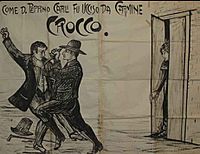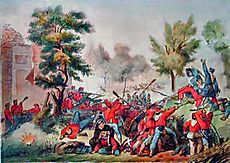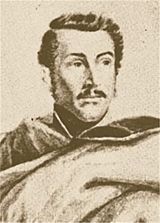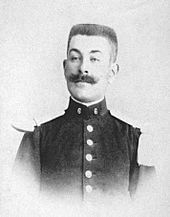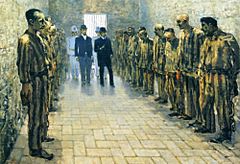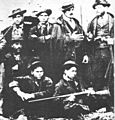Carmine Crocco facts for kids
Quick facts for kids
Carmine Crocco
|
|
|---|---|
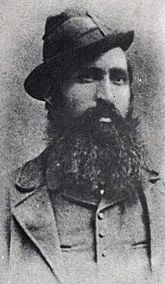 |
|
| Born | 5 June 1830 Rionero in Vulture, Basilicata, Italy
|
| Died | 18 June 1905 (aged 75) Portoferraio, Tuscany, Italy
|
| Other names | Donatello |
| Organization | Brigandage in the Two Sicilies |
Carmine Crocco, also known as Donatello, was an Italian brigand. A brigand was like an outlaw or a bandit, often leading a group of armed men. Crocco was born in Rionero in Vulture on June 5, 1830, and died in Portoferraio on June 18, 1905.
He started as a soldier for the Bourbons, who were the rulers of southern Italy. Later, he fought alongside Giuseppe Garibaldi, a famous Italian general who helped unite Italy.
After Italy became a single country, Crocco gathered an army of about two thousand men. He led one of the strongest and most feared groups in southern Italy. He was known for his clever guerrilla tactics. These included cutting off water, destroying flour mills, cutting telegraph wires, and ambushing enemy soldiers.
Some people in the 1800s and early 1900s thought of him as a "wicked thief" or a "fierce murderer." However, since the mid-1900s, many writers have seen him differently. They view him as a leader who fought for the rights of farmers and a brilliant military mind.
Today, many people in southern Italy, especially in his home region of Basilicata, see him as a folk hero.
Contents
Life Story
Growing Up
Carmine Crocco was born in Rionero in Vulture, which was then part of the Kingdom of the Two Sicilies. He was one of five children. His father, Francesco Crocco, worked for a noble family. His mother, Maria Gerarda Santomauro, was a housewife.
His uncle Martino was a soldier who fought in the Napoleonic wars in Spain. He lost a leg in battle. Crocco grew up listening to his uncle's stories and learned to read and write from him.
From a young age, Crocco felt a strong dislike for the rich upper class. This feeling grew after an incident involving his brother. A young lord hurt his brother for killing a dog that had attacked their family's chicken. Crocco's pregnant mother tried to protect her son but was injured. This sad event made Crocco feel even more strongly against unfair treatment. Later, his father was wrongly accused of trying to hurt the lord and was put in prison without good proof.
As a teenager, Crocco moved to Apulia with his brother, Donato, to work as a shepherd. In 1845, Crocco saved the life of a nobleman named Don Giovanni Aquilecchia, who was struggling in a river. Aquilecchia rewarded him with money. This allowed Crocco to return home and find a new job. He also met Don Pietro Ginistrelli, who helped get his father released from prison.
However, his father was old and sick after being released. So, Crocco became the head of his family, working as a farmer in Rionero. He met Don Ferdinando, the son of the lord who had hurt his family. Don Ferdinando felt bad about his father's actions.
Don Ferdinando offered Crocco a job, but Crocco preferred money. He used the money to avoid joining the army, as people could pay to skip military service back then. But Don Ferdinando was killed in Naples in 1848. So, Crocco had to join Ferdinand II's army. However, he left the army after a fight with a fellow soldier. While he was away, his sister Rosina had to take care of the family.
Becoming an Outlaw
While Crocco was away, his sister Rosina, who was not yet eighteen, was bothered by a nobleman named Don Peppino. Rosina was not interested in him and said no to his advances. Annoyed, Peppino started spreading bad rumors about her.
When Crocco heard about this, he was very angry and decided to stand up for his sister. He knew Don Peppino's habits and waited for him at his home one evening. When Peppino arrived, Crocco questioned him. The discussion quickly turned into a fight after Peppino hit Crocco with a whip. Crocco then fled to the Forenza woods. Some people say he killed Peppino, but this part of the story is not fully confirmed by investigations.
While hiding, Crocco met other outlaws. Together, they formed a group that lived by taking money from people and robbing. Crocco returned to Rionero but was arrested on October 13, 1855. He escaped from prison on the night of December 13–14, 1859, and hid in the woods.
Joining Garibaldi
Around this time, Giuseppe Garibaldi began his famous Expedition of the Thousand. The Kingdom of the Two Sicilies was about to fall apart. Garibaldi promised to forgive soldiers who had left the army if they joined him. Crocco joined Garibaldi's army, hoping for a pardon and other rewards. He went with Garibaldi to Naples and fought bravely in the important Battle of Volturnus.
Even though he fought well, Crocco did not receive any awards. Instead, he was arrested. He was taken to a prison in Cerignola. But with the help of the noble Fortunato family, he managed to escape.
Crocco felt let down by the new Italian government, which he felt had broken its promises. Some noblemen who supported the Bourbons and local church leaders convinced him to join their cause. They wanted to bring back the old kingdom.
Meanwhile, people in Basilicata started to rebel against the new government. They felt that their lives had not improved and they were even poorer than before. The rich class, who had supported the Bourbons, kept their power by switching sides to support Italian unification. With money and help from those who wanted the old kingdom back, Crocco gathered an army of 2,000 men. He began fighting under the flag of the Kingdom of the Two Sicilies.
Fighting for Francis II
In just 10 days, Crocco and his army took control of the entire Vulture area. In the towns they captured, he ordered that the symbols of King Francis II be displayed again. His group took over many towns. Many people, especially liberal politicians and rich landowners, were kidnapped or had to pay money. However, most ordinary people saw Crocco as a "liberator" and supported his group.
On April 7, 1861, Crocco captured Lagopesole. The next day, he took Ripacandida, defeating the local soldiers. On April 10, 1861, his army entered Venosa and took its riches. During the attack on Venosa, Crocco's men killed Francesco Nitti, a doctor and a former member of a secret society called the Carbonari. He was also the grandfather of a future politician, Francesco Saverio Nitti.
Next, they invaded Lavello. Here, Crocco set up a court and judged 27 liberals. They also emptied the town's money boxes, taking 7,000 ducats. Most of this money (6,500 ducats) was given to the people. Then they took Melfi. Crocco's army also conquered parts of Campania and Apulia.
The Bourbon government, which was in exile, was impressed by Crocco's victories. They sent a Spanish General named José Borjes to Basilicata. His job was to help organize Crocco's groups and prepare for more soldiers to arrive. Borjes wanted to capture Potenza, the Italian army's strongest base in Basilicata. Crocco didn't trust Borjes at first because he worried about losing his leadership, but he agreed to work together. Another supporter of the old kingdom, Augustin De Langlais from France, also arrived. Not much is known about him.
Crocco, with Borjes and De Langlais, captured more towns to find new recruits. These included Trivigno, Calciano, Garaguso, Craco, and Aliano. Crocco's army moved towards Potenza, taking nearby towns like Guardia Perticara, San Chirico Raparo, and Vaglio. However, the plan to take Potenza failed because Crocco and Borjes disagreed on how to fight.
After more battles, Crocco went back to Monticchio, one of his main bases. He ended his alliance with Borjes because he didn't want to serve under a foreigner. He also didn't believe the Bourbon government's promises of more soldiers. Disappointed, Borjes decided to go to Rome to tell King Francis II what had happened. But on his way, he was captured in Tagliacozzo and shot by Italian soldiers.
Later Years
Without outside help, Crocco started robbing and demanding money to get funds. He worked with other outlaws and raided areas from Molise to Apulia. The director of Public Safety in Rionero asked him to surrender, but Crocco refused. Even without the Bourbons' help, Crocco was skilled in guerrilla warfare and continued to bother the Italian soldiers.
Because Crocco's army seemed unbeatable, the Hungarian Legion, who had helped Garibaldi, joined the royal Italian army to fight him.
Suddenly, Crocco was betrayed by Giuseppe Caruso, one of his own leaders. Caruso told the Italian authorities where Crocco was hiding. Under the command of General Emilio Pallavicini, the Italian army attacked and defeated Crocco.
His group suffered many losses. Some of his main leaders, like Ninco Nanco and Giuseppe "Sparviero" Schiavone, were captured and executed. Crocco was forced to retreat towards the Ofanto area. After losing his last battle, he had to flee to the Papal States, hoping for help from Pope Pius IX, who he knew had supported those against the new Italian government.
When he arrived, Crocco was captured by papal troops in Veroli and put in prison in Rome. He was then handed over to the Italian authorities. On September 11, 1872, he was sentenced to death in Potenza. However, his sentence was changed to hard labor for life. He was imprisoned on Santo Stefano Island. There, he began writing his life story with the help of Eugenio Massa, a captain in the Italian army. Massa published Crocco's memoirs in 1903, titled Gli ultimi briganti della Basilicata (The last brigands of Basilicata).
His writings were published again after World War II by other authors. Crocco was later moved to the prison at Portoferraio, where he died on June 18, 1905.
Legacy
Crocco is the main character in a show called La Storia Bandita (The Bandit's Story). This show is performed every year in Brindisi Montagna. Famous artists like Michele Placido and Lucio Dalla have taken part in it.
The movie Il Brigante di Tacca del Lupo (1952) is loosely based on Crocco's story.
He appears in an Italian TV show called L'eredità della priora (1980).
He also has a small role in the film 'o Re (1989).
He is the main character in the 1999 movie Li chiamarono... briganti! (They called them... brigands!). Enrico Lo Verso plays Crocco in this film. The movie was not very successful and was quickly removed from cinemas. Some people thought it showed a truth that made viewers uncomfortable.
He is also the main character in the 2012 TV film Il generale dei briganti. Daniele Liotti plays Crocco in this one.
The Italian musician Eugenio Bennato wrote a song about him called Il Brigante Carmine Crocco. It's from his 1980 album Brigante se more.
In November 2008, a museum dedicated to Crocco opened in his hometown. It's called La Tavern r Crocc (The Tavern of Crocco).
The Italian actor Michele Placido says he is a descendant of Carmine Crocco. Placido was born and grew up in Apulia, and his father was from Rionero in Vulture.
Images for kids
See also
 In Spanish: Carmine Crocco para niños
In Spanish: Carmine Crocco para niños
 | Valerie Thomas |
 | Frederick McKinley Jones |
 | George Edward Alcorn Jr. |
 | Thomas Mensah |


